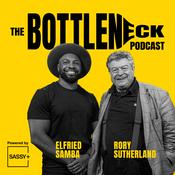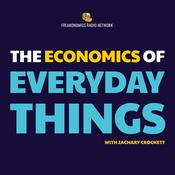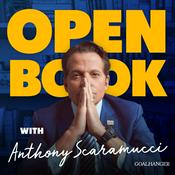233 episodes
Episode 233: Navigating ADHD and Rejection Sensitivity as a Therapist [featuring Bobbi-Jo Molokken]
07/2/2026 | 38 mins.As an ADHD therapist, coach, and entrepreneur, navigating professional and personal life comes with unique challenges—and opportunities.
In this episode, Patrick Casale and Bobbi-Jo Molokken, psychotherapist, ADHD coach, and founder of Embrace the Muchness, LLC, dive into topics like Rejection Sensitive Dysphoria (RSD), real-life ADHD accommodations for therapists, and the importance of authentic self-disclosure with clients.
Here are 3 key takeaways:
Accommodations Are Essential, Not Optional: Implementing simple strategies like concurrent note-taking, scheduled sending of emails, and pausing to address recurring thoughts can increase effectiveness in both sessions and business operations.
Name and Normalize Your Experience: Recognizing and labeling RSD can help you create space between feeling and reaction, leading to healthier decision-making and emotional regulation—especially when facing criticism or feedback.
Model Neurodivergent Coping Tools for Clients: Transparently sharing your own supportive strategies in sessions doesn’t just help you—it's also invaluable modeling for ADHD clients who need to see that accommodations are not a weakness but a strength.
If you’re a therapist or entrepreneur navigating ADHD, remember: relatability fosters accessibility. Embrace your muchness, and don’t be afraid to show up as your authentic self—for your clients and your community.
More about Bobbi-Jo:
Bobbi-Jo Mol-okken, LISW, CCTP, is a psychotherapist and ADHD coach based in Iowa. Diagnosed with ADHD as an adult and a parent of ADHD children, she brings both personal and professional insight to her work. She is passionate about providing neurodiversity-affirming education and resources that empower individuals and professionals to better understand and support ADHD.
She is the founder of Embrace the Muchness LLC, where she offers ADHD coaching, professional development training, clinical consultation, and digital resources designed for neurodivergent individuals and those who support them. She recently released the Inner Equilibrium Audit, a three-phase self-reflection tool that helps individuals explore patterns of time use, energy balance, and executive functioning in daily life.
Instagram: instagram.com/embracethemuchness
Free Facebook Group: facebook.com/groups/embracingthemuchness
Website: embracethemuchness.com
–––––––––––––––––––––
🎙️Listen to more episodes of the All Things Private Practice Podcast
🎙️Spotify
🎙️Apple
🎙️Episode 232: Push-Pull of AuDHD Burnout: ADHD Excitement vs. Autistic Exhaustion [featuring Atsede Scarseth]
31/1/2026 | 44 mins.AuDHD Burnout goes beyond overwhelm felt from external forces in life and into an internal struggle of navigating the everyday tug-of-war needs and desires stemming from being both Autistic and ADHD.
In this episode, Patrick Casale talks with Atsede Scarseth, an AuDHD LPC, Coach, and Certified Yoga Teacher, about the complexities of AuDHD (Autistic + ADHD) burnout, masking, and the necessity of both self-acceptance and truly restorative rest, particularly as a neurodivergent entrepreneur.
Here are 3 key takeaways:
Burnout is Nuanced: It’s not just about overworking; neurodivergent people often burn out from sensory overload, masking, or pushing past personal limits—not simply job stress.
Integration is Key: Insight into your neurodivergence is only the beginning. Real transformation—and healing—happens when you learn to embody those insights and adjust your life accordingly.
The Power of Neurodivergent Community: Building spaces (like specialized retreats) where unmasking is welcomed and rest is prioritized can be transformative. It’s about community, not just survival.
More about Atsede:
Atsede (At-sed-uh) is a Licensed Professional Counselor, Coach, and Certified Yoga Teacher. Originally from New York, she’s lived in Colorado for 10+ years. Atsede completed her Masters of Arts in Clinical Mental Health Counseling at Northwestern University. Her neurodivergence (Gifted, AuDHD), various life experiences, and unique worldview allows her to meet people where they are authentically. She enjoys music, nature, and intuitive movement as each one holds a significant place in her life and informs how she interacts and connects with those around her. Atsede spent much of her early years confused, overwhelmed, and anxious despite her ability to “successfully” navigate the majority of situations she was presented with. Her journey to understanding her needs and how to take care of herself included a holistic approach involving mental, physical, and spiritual wellness. She likes to balance evidence-based therapeutic modalities and spiritually aligned practices (yoga, psychedelic work, intuitive practices, etc.). She also enjoys traveling and experiencing different ways of living, which hosting retreats allows her to do while giving back to the communities she’s sharing space with.
Retreat Offer: Check out Neurodivergent by Nature: A Lush Getaway in Ireland. This is a retreat for the Neurodivergent, highly sensitive feelers to get together, unmask, reset, rest, learn, and connect. Use code PATRICK for $300 off the experience. Learn more: unearthingchoicecounseling.com/ireland
Instagram: instagram.com/atsedescarseth
YouTube: youtube.com/@atsedescarseth
–––––––––––––––––––––
🎙️Listen to more episodes of the All Things Private Practice Podcast
🎙️Episode 231: Neurodivergent Friendships and Social Struggles [featuring Caroline Maguire]
24/1/2026 | 33 mins.In this episode, Patrick Casale talks with Caroline Maguire, ACCG, PCC, M.Ed. Caroline is an award-winning author and coach whose work inspires crucial conversations around social skills, friendship, and belonging—especially for neurodivergent adults. Patrick and Caroline discuss everything from unmasking and authentic connection to the real-life struggles and victories of forming meaningful relationships as adults who think differently.
Here are 3 key takeaways:
Go with Your Gut: Whether you’re writing, working, or building friendships, trust your instincts. Embracing confidence in your own voice—even when it means not pleasing everyone—is essential for authenticity and fulfillment.
Friendship Isn’t One-Size-Fits-All: Forget “traditional” networking advice. For neurodivergent adults, it’s about finding high-interest, safe spaces and understanding your own sensory needs. Deep connection can happen outside the typical social settings—there’s no single path to friendship.
Honor Your Energy and Needs: Setting boundaries and being honest about what drains or energizes you is vital. The friends who respect your limits (whether it’s choosing not to be in social situations, preferring smaller gatherings, or picking shade over sun) are your people.
More about Caroline:
Caroline Maguire, ACCG, PCC, M.Ed., is an award-winning author, coach, teacher, and keynote speaker whose work has inspired important conversations about social skills, friendship, and belonging. Caroline has been a rock for thousands of people who struggle to make friends. Her book “Why Will No One Play With Me?” has won several awards, including the Best Book Award from American Book Fest, Mom’s Choice Award for Honoring Excellence, and Book Authority’s award for Best ADHD Books of All Time. Caroline’s next book for adults, Friendship Skills for the Neurodivergent: A Guide for the Quirky, Anxious, and Easily Distracted, will release in April 2026.
Website: carolinemaguireauthor.com
Facebook: facebook.com/AuthorCarolineM
Instagram: instagram.com/authorcarolinem
YouTube: youtube.com/channel/UCnDmu0c8kr0co2ppXo3EC8A
Twitter: twitter.com/AuthorCarolineM
LinkedIn: linkedin.com/in/authorcarolinecm
TikTok: tiktok.com/@authorcarolinem
Pinterest:Episode 230: Therapist Turned Comedian: Embracing ADHD and Change [featuring Mim Kempson]
17/1/2026 | 31 mins.In this episode, Patrick Casale talks with Mim Kempson, a neurodivergent therapist, relationship expert, and now, stand-up comedian making bold moves from Australia to Montreal.
Mim offers a raw take on embracing neurodivergence and designing life—and business—around personal strengths and values. Her journey is proof that our differences can become our superpowers, whether in the therapy room or on a comedy stage.
Here are 3 key takeaways:
Context is Everything: Success as a neurodivergent professional often depends less on “fixing” ourselves and more on finding (or creating) environments where we thrive.
Leaning Into Discomfort Spurs Growth: Mim’s willingness to embrace discomfort, navigate big moves, and take creative risks led to new fulfillment in both her clinical and comedic careers.
You Don’t Have to Fit Into One Box: Therapists (and all of us) are more than just one role—exploring multiple passions can lead to richer careers and lives.
“When you put a neurodivergent person in the right context, there’s very little we can’t face.” – Mim Kempson
More about Mim:
Mim Kempson (she/her) is an AuDHD Therapist and has run her private practice in Australia for over 6 years, specializing in sex and relationship therapy for neurodivergent adults and couples. As a multi-passionate AuDHDer herself, Mim recently moved to Montreal to pursue her dream in standup comedy. Mim now runs her therapy and coaching practice fully online, seeing clients internationally.
Mim is launching a private podcast (subscription-based) called “Therapy After Hours” which will be about honouring our own needs through navigating the transition from 2025 into a new year. Check out her Instagram for more information.
Instagram: instagram.com/mimkempsonofficial
Website: mimkempson.com
–––––––––––––––––––––
🎙️Listen to more episodes of the All Things Private Practice Podcast
🎙️Spotify
🎙️Apple
🎙️YouTube Music
▶️ YouTube
✈️ Learn about Retreats
🗨️ Join the free Empowered Escape FB Community
🗨️ Join the freeEpisode 229: Mixed Neurotype Couples: Before and After Diagnosis [featuring Thomas Kear and Lauren Sanderson]
10/1/2026 | 35 mins.In this episode, Patrick Casale talks with Thomas Kear and Lauren Sanderson, founders of neuroduo, about being in a mixed neurotype relationship, navigating ADHD and Autism, whether diagnosed or not. This conversation is packed with real-life reflections on neurodiversity, partnership, and communication.
Here are 3 key takeaways:
Understanding Yourself First is Crucial: Before you can support your partner, you need to understand and learn about your own neurodivergence—only then can you communicate your needs and work together.
Communication Styles Can Be Wildly Different: The “Thunderstorm and Turtle” analogy for mixed neurotype partnerships (ADHD and Autistic) is a powerful reminder that urgency and withdrawal can clash, but knowledge and compassion make repair possible.
Diagnosis Brings Validation, Not Instant Solutions: Getting an Autism or ADHD diagnosis doesn’t change who you are overnight, but it does give you the language and understanding you need to stop blaming yourself—and to ask for what you need.
More about Thomas and Lauren:
We’re Lauren and Tom, a neurodivergent couple living in Queenstown, New Zealand. After both receiving ADHD diagnoses as adults (Tom also with Autism and OCD a year prior), we launched neuroduo – a platform to share our lived experiences with ADHD and Autism. Through storytelling, humour, and real talk, we help others feel seen, understood, and empowered.
Our aim is to educate, empower, and advocate for neurodivergent people by sharing real, lived experiences and building more inclusive spaces — one conversation at a time.
Instagram: instagram.com/neuroduo
–––––––––––––––––––––
🎙️Listen to more episodes of the All Things Private Practice Podcast
🎙️Spotify
🎙️Apple
🎙️YouTube Music
▶️ YouTube
✈️ Learn about Retreats
🗨️ Join the free Empowered Escape FB Community
🗨️ Join the free All Things Private Practice FB Community
–––––––––––––––––––––
Thanks to Our Sponsors: The Receptionist for iPad &More Business podcasts
Trending Business podcasts
About All Things Private Practice Podcast
All Things Private Practice Podcast TM is where we dive deep into the gritty, unfiltered world of being a mental entrepreneur, mental health professional, and a private practice therapist. Join us as we explore the emotional roller coaster of small business ownership, tackling the raw and unapologetic aspects that often go unspoken. In each episode, we fearlessly dissect self-doubt, resilience, impostor syndrome, and paralyzing perfectionism. This podcast normalizes fear and failure and helps make the small business journey relatable. Patrick Casale is an Autistic ADHD licensed clinical mental health therapist, group practice owner, business coach, consultant, Keynote speaker, retreat host, and 7-figure entrepreneur. He interviews industry experts to share their stories of resilience, and to offer "how-tos" to help support your entrepreneurial journeys. Like the podcast? Make sure to follow, subscribe, and leave a 5 star review https://podcasts.apple.com/us/podcast/all-things-private-practice-podcast/id1596161682 This is the All Things Private Practice Podcast, where authenticity meets audacity, and the road to success is paved with resilience. Doubt Yourself Do It Anyway TM Listen to all episodes https://www.allthingspractice.com/all-things-private-practice-podcast Hire Patrick to speak, for 1v1 entrepreneurial coaching, or join him on a retreat allthingspractice.comPodcast websiteListen to All Things Private Practice Podcast, The Diary Of A CEO with Steven Bartlett and many other podcasts from around the world with the radio.net app

Get the free radio.net app
- Stations and podcasts to bookmark
- Stream via Wi-Fi or Bluetooth
- Supports Carplay & Android Auto
- Many other app features
Get the free radio.net app
- Stations and podcasts to bookmark
- Stream via Wi-Fi or Bluetooth
- Supports Carplay & Android Auto
- Many other app features


All Things Private Practice Podcast
Scan code,
download the app,
start listening.All Things Private Practice Podcast: Podcasts in Family






































